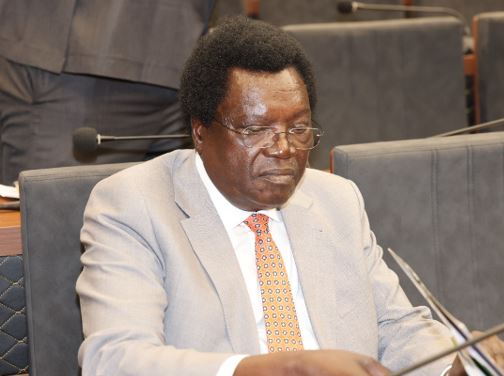Central Equatoria State Governor Gen. Augustino Jadalla on Wednesday told members of the Transitional National Legislative Assembly (TNLA) that his administration has no control over the supply or pricing of water within Juba City and its environs.
The governor was appearing in the House after being summoned together with other officials to answer queries about high water prices in Juba County.
Juba residents have always voiced concern and say they are charged exorbitantly with one drum of water being sold at between 6,000 and 7,000 SSP up from 5,000 just recently.
Jadalla clarified that the national government took over the management of water services and electricity generation and distribution in Juba County following the establishment of the Government of Southern Sudan (GoSS) during the interim period of the Comprehensive Peace Agreement between 2005 and 2011.
According to the Governor’s Press Unit, Jadalla told the lawmakers that the role of the state is to support and help South Sudan Urban Water Corporation when there is a crisis and in dispute resolution where necessary.
Pal Mai Deng, South Sudan’s Minister of Water Resources and Irrigation, also appeared in the House on the same issue and admitted that the mandate of managing water services lies within his purview.
The Central Equatoria State governor urged the TNLA to treat the issue of high water prices as a “national security issue and handle it with utmost care.”
“Focus should be put on the establishment of a piped water system and there is a need for the government to consider subsidies on fuel and other water treatments,” he stated.
Among the resolutions passed by the members of Parliament aimed at addressing the water high prices included directives to the National Ministry of Water Resources and Irrigation, South Sudan Urban Water Corporation, and National Revenue Authority to coordinate on issues of handling charges and taxes on water management.
The stakeholders in water management were also directed to consider subsidizing fuel for water tankers. The interior ministry was also directed to stop and prohibit traffic police officers from extorting money from water tanker drivers.
The Governor was accompanied to parliament by the State Minister of Housing, Lands, and Public Utilities, the Commissioner of Juba County, and the Mayor of Juba City Council.
Meanwhile, appearing before the House, Water Resources Minister Pal Mai, illuminated that his ministry and the South Sudan Urban Water Corporation, which is within his docket, do not have the mandates to set the prices for commercial water tankers that deliver water in and around Juba.
He said that the water corporation sells a drum of water to the tanker drivers at SSP 500 but they then go and retail at their prices.

“The owners of the blue tankers come and take a drum of water from South Sudan Urban Water Corporation at only SSP 500 and go to sell this drum of water at a price they determine on their own,” he stated. “But for your information, South Sudan Urban Water Corporation does not have any direct relationship with the owners of the blue tankers.”
Minister Mai revealed that there is an urgent need to upgrade to a larger water treatment plant that can process 200 cubic meters per second to cover the city and its environs because the current plant is too small to serve the population.
“We have small funding from the African Development Bank which enabled us to expand household connections, and as we speak, we have succeeded in connecting 6,000 households and our target is 8,000,” he said.




